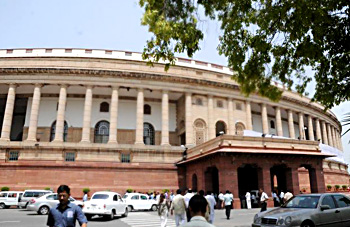 Indian Speaker occupies a rather important role in the parliamentary democracy of the country. It is the Speaker who represents the full authority of the house itself. The responsibilities of the Speaker are quite overwhelming as every aspect of parliamentary affairs has to be overlooked by him/her. When the Speaker speaks, it is for the House as a whole. In the Warrant of Precedence in the country, the Speaker stands next to the Indian President, the Vice-President and the Prime Minister.
Indian Speaker occupies a rather important role in the parliamentary democracy of the country. It is the Speaker who represents the full authority of the house itself. The responsibilities of the Speaker are quite overwhelming as every aspect of parliamentary affairs has to be overlooked by him/her. When the Speaker speaks, it is for the House as a whole. In the Warrant of Precedence in the country, the Speaker stands next to the Indian President, the Vice-President and the Prime Minister.
Election of Indian Speaker
In the Lok Sabha, the lower House of the Indian Parliament, both Presiding Officers- the Speaker and the Deputy Speaker- are elected from among its members by a simple majority of members present and voting in the House. As such, no specific qualifications are prescribed for being elected the Speaker. The Constitution of India only requires that Speaker should be a member of the House. But an understanding of the Constitution and the laws of the country and the rules of procedure and conventions of Parliament is considered a major asset for the holder of the office of the Speaker. Usually, a member belonging to the ruling party is elected the Speaker. A healthy convention, however, has evolved over the years whereby the ruling party nominates its candidate after informal consultations with the Leaders of other Parties and Groups in the House. There are also instances when members not belonging to the ruling party or coalition were elected to the office of the Speaker.
Once a decision on the candidate is taken, her name is normally proposed by the Prime Minister or the Minister of Parliamentary Affairs. If more than one notice is received, these are entered in the order of receipt. The Speaker pro term presides over the sitting in which the Speaker is elected, if it is a newly constituted House. If the election falls later in the life of a Lok Sabha the Deputy Speaker presides. The motions which are moved and duly seconded are put one by one in the order in which they are moved, and decided, if necessary, by division. If any motion is carried, the person presiding shall, without putting the latter motions, declare that the member proposed in the motion which has been carried has been chosen as the Speaker of the House. After the results are announced, the Speaker-elect is conducted to the Chair by the Prime Minister and the Leader of the Opposition. She/he is then felicitated by Leaders of all Political Parties and Groups in the House to which she replies in a thanks-giving speech. And from then the new Speaker takes over.
Term of Office of Indian Speaker
The Speaker holds office from the date of election till immediately before the first meeting of the Lok Sabha after the dissolution of the one to which he/she was elected. The Speaker is eligible for re-election. On the dissolution of the Lok Sabha, although the Speaker ceases to be a member of the House, she/he does not vacate her office. The Speaker may, at any time, resign from office by submitting a resignation to the Deputy Speaker. The Speaker can be removed from office only on a resolution of the House passed by a majority of all the then members of the House. Such a resolution has to satisfy some conditions like: it should be specific with respect to the charges and it should not contain arguments, inferences, ironical expressions, imputations or defamatory statements, etc. Moreover, the discussions should be confined to charges referred to in the resolution. It is also mandatory to give a minimum of 14 days` notice of the intention to move the resolution.
The Constitution of India provides that the Speaker`s salary and allowances are not to be voted by Parliament and are to be charged on the Consolidated Fund of India.
Functions of Indian Speaker
The Speaker has extensive functions to perform in matters administrative, judicial and regulatory, falling under his/her domain. He/she enjoys vast authority under the Constitution and the Rules, as well as inherently. As the conventional head of the Lok Sabha and as its principal spokesman, the Speaker represents its collective voice. He/she is the ultimate arbiter and interpreter of those provisions which relate to the functioning of the House. The decisions of the Speaker are final and binding and ordinarily cannot be questioned, challenged or criticised.




















